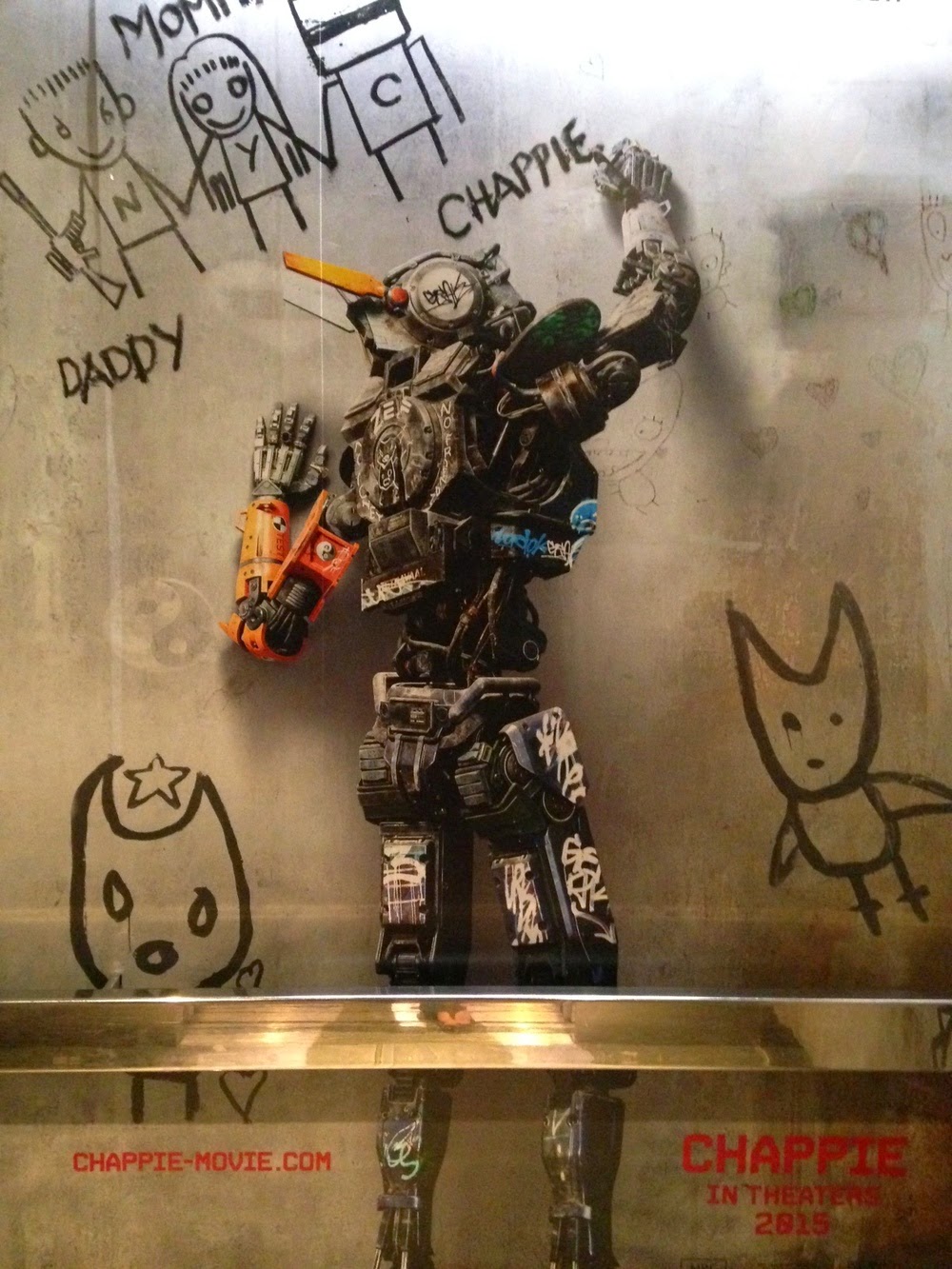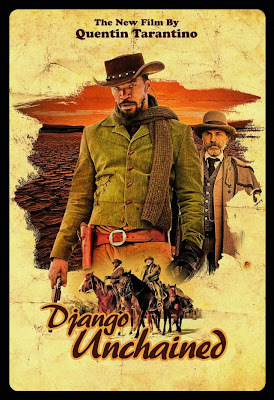‘Chappie’ Is A Reject (Movie Review)
CHAPPiE: 2 out of 5
Yolandi:
It’s more than just a machine!
Writer/director Neill
Blomkamp’s latest big screen project is a film that tackles the ideas of
artificial intelligence and the big questions that come from creating a machine
that thinks. It is set in Johannesburg,
a few years in the future, and finds the lead characters dealing with robots
and their effectiveness in a world where criminal activity and the lines
between beings that are different from each other very much matter. It is basically another Blomkamp movie, which
should inspire more good faith if one were to only judge him off of his
ambitious first film, District 9, the
2009 Best Picture nominee that twisted an apartheid allegory into a
sci-fi/thriller. Unfortunately, after
the step down that was Elysium, a
film that dealt with economic turmoil and healthcare, wrapped up in the guise
of a sci-fi/thriller, Chappie feels
like another step down. The film has
some ideas and certainly looks good (as one would expect), but is all over the
place and lacks much coherence, beyond honest intentions.
The problems start
pretty quickly, as the film opens with an unnecessary flash-forward that calls
to mind District 9 in terms of the
cinematic approach. Once we head back in
time though, one can easily see where things are going just by the setup of
three key characters. Dev Patel stars as
Deon Wilson, the wiz-kid robot engineer, who just wants to do good by way of
experimenting with AI programs. Hugh
Jackman is Vincent Moore, the opposite of Deon, who wants total human control
of his big bad robot design. Then there
is Sigourney Weaver as Michelle Bradley, the owner of the company responsible
for these robots, but acts as a gullible politician siding with whatever sounds
best, as far as profit margins and credibility goes. These are all capable actors and they try,
but the writing by Blomkamp and Terri Tarchell (who both shared credit on District 9, as well) undercuts so much
here, among other areas in the film.
This brings us to the
other side of the story, which features Ninja and Yolandi, members of the South
African hip-hop group Die Antwoord, who apparently star as hoodlum versions of
themselves. They are smashed into this
film as criminals, along with their friend ‘America’ played by Jose Pablo
Cantillo, who need to pull off a big heist to get themselves out of debt with
another criminal. It should be noted
that all of these criminals have the most impressive hair of the film, even
more so than the mini-mullet that Jackman’s character has. Regardless of the various hairstyles of the
future though, Die Antwoord and America hatch a plan to kidnap Deon in an
effort to make him turn off his robots, only to find something much more
intriguing.
I think it can be
argued that Chappie is a much looser
tale than Blomkamp’s previous films, but even with that in mind, he still seems
to rely on a lot of the same sort of material to make his point. This would not be a bad thing if the film did
not feel like it was in such a rush to tackle so many ideas at once or had a
better idea of how to tell a story, without resorting to violent South African
gang warfare yet again. Unfortunately,
while taking ideas that are uniquely one’s own is one thing, having us follow
along unlikable/questionably acted characters and throwing out neat ideas only
to abandon them or take huge leaps in logic is another.
The heart of this story
is Chappie (voiced and performed via motion capture by Blomkamp’s lucky charm
(?) Sharlto Copley), an experimental robot assembled by Deon, who has uploaded
a software update that allows for Chappie to learn, think, feel, and react on
his own. It is sentient and the film
very much wants us to appreciate that.
The film also wants us to have fun with seeing Chappie ‘grow up’ under
the tutelage of gangsters, as we watch it learn to walk the walk and talk the
talk. Chappie only has a short term life
span though, based on the robot body its ‘brain’ is connected to, so it affords
it the opportunity to ask the big questions like what the meaning of death is.
There are lots of ways
to deal with Chappie, but Die Antwoord
was simply too far out of an idea and takes this film down routes that were far
less interesting to me, compared to something less aggressive. There are moments of fun, as the ‘robot is a
fish-out-of-water’ concept led to two Short
Circuit films after all, but it comes at the expense of following some
weird characters. The professional
actors do not fare much better either, as this is a film that somehow makes the
very charismatic Hugh Jackman into a one-dimensional, unlikable jerk, which is
not an easy feat. There are so many
strange choices made as far as seeing these characters react to news
surrounding Chappie and the nature of the robots these people are working with,
it ends up making it very hard to care about much that takes place in the story.
I can imagine some
would say the saving grace is the visuals and the action that takes place, as
well as the strong score by Hans Zimmer.
Well, the score is good, yes, as are the visuals, but it is hard to give
credit to aspects that you know are going to be quite strong to begin
with. Sure, the visuals look great for a
film that works on a modest budget, given Chappie’s
scope, but Blomkamp has proven to be a solid visual director. At this point though, it is time for Blomkamp
to work on his approach to storytelling, as Chappie
not only heads in multiple directions in an attempt to get its points across,
but feels incomplete by its end, utilizing unearned character transitions and a
clichéd final shot as a means to suggest closure with an ellipses, because why
not…
Chappie
was disappointing. Shift around or
remove some elements and there could be either an interesting look at the
effect of AI on a world that is continually dealing with the notion of drones
(which basically describes nearly every recent Hollywood action blockbuster) or
a goofy dark comedy about a robot that learns to love from the perspective of
nogoodniks. As it stands, this is a
good-looking film with entertaining moments and is generally engaging for most
of its 2 hour runtime, but continually stumbles, has smart characters do a lot
of dumb things, and has little in the way of understanding what makes for a proper
story. The ideas are there, but the film
settles for much less.
Ninja:
It’s time to pump up the jam!











I found one successful example of this truth through this blog. I am going to use such information now. Robot 6 Axis
ReplyDelete